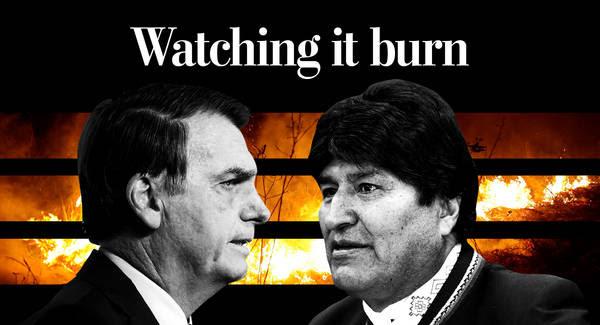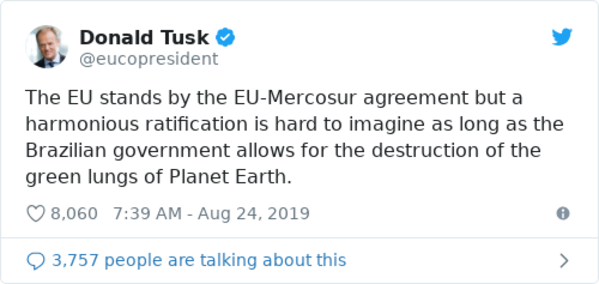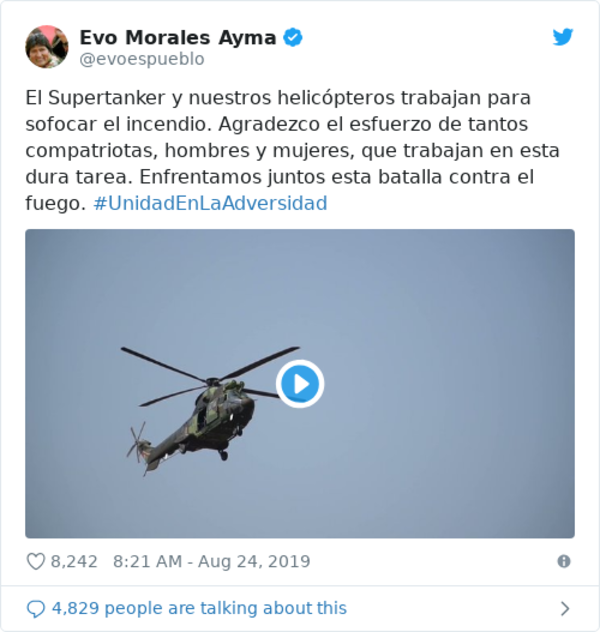The Amazon fires put spotlight on two rival leaders

(Eraldo Peres/AP; David Mercado/Reuters)
Even as fires rage in both their countries, there’s little neighborly love between the leaders of Brazil and Bolivia. International scrutiny has fallen on both countries following a summer where vast tracts of the world’s most important forest went up in flames. In Brazil, there’s been a more than 80 percent spike in the number of fires from 2018, a development that garnered international headlines when the city of Sao Paulo got cloaked in sooty smoke last week.
Similar pollution reached Bolivia’s largest city, Santa Cruz. An area roughly the size of Connecticut in Bolivia’s densely forested Chiquitania region, on the border with Brazil and Paraguay, has burned to the ground this summer, endangering hundreds of animal species. By one account, it may take Bolivia’s forests two centuries to recover.
But don’t expect either Brazilian President Jair Bolsonaro or his Bolivian counterpart, President Evo Morales, to come to the other’s aid. When the former, a far-right firebrand, took office at the start of the year, the latter, a South American leftist stalwart, tweeted his disgust at “the reemergence of white supremacist (KKK) ideology” in the continent’s politics.
The feelings were mutual. At Bolsonaro’s inauguration, Morales, the only regional left-wing leader to attend, was jeered by the new president’s supporters as a “communist” and a “f---ing Indian.” In an interview with the Brazilian newspaper O Globo, a lawmaker in Bolsonaro’s political party scoffed at critics who worried about the risks facing Brazil’s indigenous communities under the new president’s watch. “If you like Indians, you should go to Bolivia,” said Rodrigo Amorim, the recently elected congressman, referring to Morales’s indigenous ethnicity. “As well as being communist, it’s governed by an Indian.”
Since coming to power in 2005, Morales has been unabashed about his origins and his desire to uplift his country’s most marginalized. He leveraged a boom in natural gas and mineral exports to redistribute the wealth and bring hundreds of thousands of Bolivians into the middle class through populist social plans that guaranteed him reelection in 2009 and 2014. Although Bolivia remains one the continent’s poorest countries, its gross domestic product per capita has tripled while Morales has been president.
But Morales’s popularity has been waning. He is seeking reelection in October for an unprecedented fourth term — a bid only possible after he controversially circumvented the results of a 2016 referendum that blocked him from scrapping constitutional term limits.
Meanwhile, Bolsonaro’s antipathy toward both indigenous minorities and leftists has been a defining streak of his politics. During his successful 2018 election campaign, he tarred his domestic opponents as would-be leftist autocrats in the vein of Venezuela’s Nicolás Maduro — and, indeed, Morales. And, now in command, Bolsonaro has followed through on his campaign trail vows: a restructuring or wholesale dismantling of Brazil’s existing environmental protections for indigenous areas in the Amazon, to the benefit of the country’s powerful agribusiness industry. Not for nothing did he earn the sobriquet “Captain Chainsaw.”
 |
Those moves provide the backdrop to the unfolding calamity in the Amazon rainforest, referred to widely as the “lungs” of the planet. Critics, including prominent politicians in Europe and elsewhere, argue that Bolsonaro has emboldened cattle ranchers and loggers to start setting fires to clear land. At the Group of Seven summit in France on Monday, French President Emmanuel Macron announced an immediate fund of $20 million to help fight the fires in the Amazon. He and other European leaders have also threatened to stall a free-trade deal between the European Union and a bloc of South American nations over Bolsonaro’s harmful policies.
This censure has not played well in Brazil. “From the start, Bolsonaro, like U.S. President Donald Trump, stacked his cabinet with science deniers who call climate change a Marxist hoax and made his open disdain for minority communities who depend on the Amazon a hallmark of his political messaging,” noted reporters for HuffPost Brazil. “Now, both leaders distract from fierce criticism and low polling at home by recasting criticism from media or other countries as unfair mudslinging from ideological opponents.”
Bolsonaro has angrily lashed out at his critics and recently warned his supporters that “Brazil is the virgin that every foreign pervert wants to get their hands on.” On Monday, his government rejected the G-7 aid on offer, saying in a statement that the funds should be used instead to reforest Europe and save the continent’s famous cathedrals like Notre Dame in Paris.
“The Bolsonaro administration is trying to produce a rally-around-the-flag effect,” said Matias Spektor, an associate professor of international relations at the Getúlio Vargas Foundation in Sao Paulo, to my colleagues. “They are trying to denounce Macron … and the international press and the NGOs as a coalition that is set on suspending Brazilian sovereignty over the Amazon and it’s our duty to fight back.”
Though they are far from kindred spirits, Morales and Bolsonaro share a similar culpability in what has unfolded this summer. The Bolivian president’s administration initially played down the scale of the fire before realizing its horrific reach after an outcry. Morales suspended his reelection campaign to help coordinate his government’s response. After his earlier reticence, he did an about-face and said he welcomes whatever aid the rest of the world can muster for Bolivia’s firefighting efforts.
 |
But critics argue that the fires in Bolivia are also a product of policies that encouraged deforestation, including a recent decree aimed at boosting beef production for export that infuriated Bolivian civil society. Morales has a “top-down mentality about imposing development projects on the Amazon,” said Andrew Miller of conservation organization Amazon Watch on the left-wing radio show Democracy Now. “So, at the same time that Evo Morales has had some progressive policies, he’s also had tensions with indigenous peoples.”
And suddenly, Morales has something in common with his ideological foe across the border. “The two countries most affected [by the fires] have governments at opposite ends of the political spectrum, but their position on deforesting the Amazon is the same,” said Eugenio Coter, a prominent Bolivian bishop, to Catholic News Service. “There is no political or economic plan for the Amazon that does not depend on the extraction of natural resources.”
|